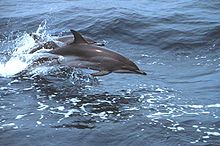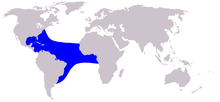Clymene dolphin
| Clymene dolphin | |
|---|---|
 |
|
| Clymene dolphins | |
 |
|
| Size compared to an average human | |
| Scientific classification | |
| Kingdom: | Animalia |
| Phylum: | Chordata |
| Class: | Mammalia |
| Order: | Artiodactyla |
| Infraorder: | Cetacea |
| Family: | Delphinidae |
| Genus: | Stenella |
| Species: | S. clymene |
| Binomial name | |
|
Stenella clymene Gray, 1846 |
|
 |
|
| Clymene dolphin range | |
The Clymene dolphin (Stenella clymene), in older texts known as the short-snouted spinner dolphin, is a dolphin endemic to the Atlantic Ocean. It is the only confirmed case of hybrid speciation in marine mammals, descending from the spinner dolphin and the striped dolphin.
The Clymene dolphin was first formally described by John Edward Gray in 1846, although, unusually, he did not assign it its current name until four years later, in 1850. From then on, until a reassessment in 1981, the Clymene dolphin was regarded as a subspecies of the spinner dolphin (Stenella longirostris). In 1981, Perrin et al. asserted the Clymene's existence as separate species. Until this time, because Clymenes are relatively remote and were regarded as very similar to the more accessible spinners, they were never heavily studied. Anatomical and behavioral traits suggested that this species is a hybrid of the spinner dolphin (Stenella longirostris) and the striped dolphin (Stenella coeruleoalba), and DNA testing has shown that it is indeed a hybrid species.
The common and scientific names are probably derived from the Greek oceanid Clymene, although it has also been argued that it may instead come from the Greek word for "notorious".
The Clymene dolphin looks very similar to the spinner dolphin. At close quarters, it is possible to observe that the beak of the Clymene is slightly shorter than that of its relative. The dorsal fin is also less erect and triangular.
The basic color of the Clymene dolphin is "cetacean neapolitan" - it occurs in three shaded layers — the underside being white. Next, a strip of light grey runs from just above the beak, round either side of the eye back to the tail stock, where the band thickens. The top layer, from the forehead, along the back to the dorsal fin, and down to the top of the tail stock, is a dark grey. The beak, lips, and flippers are also dark grey in color. Clymene dolphins grow to about 2 m (6.6 ft) in length and 75 to 80 kg (165 to 176 lb) in weight.
...
Wikipedia

